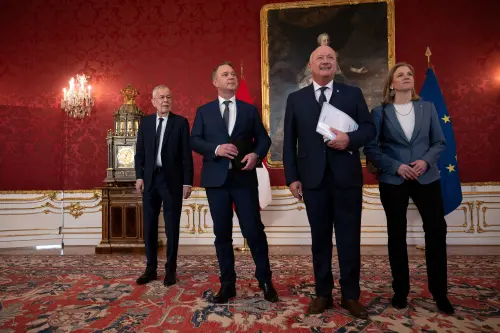VIENNA, Feb 22 (Reuters) - Austria's three main centrist parties in parliament indicated on Saturday that they were close to reaching an agreement, nearly five months after the far-right Freedom Party (FPO) won the election but is now marginalized.
A pact between the conservative People's Party (OVP), Social Democrats (SPO), and liberal Neos would conclude the lengthiest period without a new Austrian government since World War Two.
OVP leader Christian Stocker expressed optimism, stating, "I am very confident that in the common ground that we have found, we will manage to finalize a coalition government agreement," during a media briefing with other party leaders.
Efforts to form a coalition have been challenging since the FPO, led by Herbert Kickl, secured 29% of the vote in September's election but did not secure a majority.
Should an agreement be reached, it would establish Austria's first three-party government since 1949 and likely see Stocker assume the role of chancellor shortly after taking over the OVP leadership from former chancellor Karl Nehammer.
The prolonged negotiations underscore the struggles many European countries face in establishing stable governments amid the rise of far-right parties like the eurosceptic, Russia-friendly FPO, spurred by concerns over economic stagnation and immigration issues.
Following its exclusion from initial coalition talks after the election, the FPO re-entered negotiations after an unsuccessful attempt by the OVP, SPO, and Neos to form a coalition in early January. However, subsequent discussions with the OVP also collapsed, leading the FPO to push for new elections.
Stocker, alongside SPO's Andreas Babler and Neos' Beate Meinl-Reisinger, spoke at President Alexander Van der Bellen's office after briefing him on the progress.
Expressing readiness to enter the final phase of discussions, Babler and Meinl-Reisinger indicated progress. "We're on the home stretch; we're not over the line yet, the willingness is there," Meinl-Reisinger stated.
Foreign Minister Alexander Schallenberg of the OVP, who also acted as interim chancellor since January, confirmed he would not be part of the next government, further hinting that talks might have touched upon ministerial roles.
The political impasse has coincided with two years of negative economic growth in Austria, prompting President Van der Bellen to urge the parties to find common ground amidst tensions between Europe and the U.S. since President Donald Trump's return.
"The coming years will be difficult," said the 81-year-old Van der Bellen, a former leader of Austria's Greens. "Not only because of the economic situation, but also because of the geopolitical situation."
Europe needs to be proactive and united, as the uncertainties in the transatlantic relationship have quickly surfaced, Van der Bellen emphasized.
